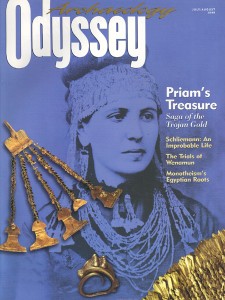Who Owns Priam’s Treasure?: An Odyssey Debate
Discovered at Troy; smuggled to Greece, bestowed upon Germany; confiscated by the USSR—Schliemann’s gold is still causing a ruckus.
Return the Treasure to Germany
Why should the events of World War II abrogate longstanding agreements over cultural ownership?
Priam’s Treasure belongs in Berlin’s Museum of Pre- and Early History, part of the German system of federal museums.
Heinrich Schliemann excavated the Trojan hoard in 1873. It then passed into his hands in 1875, when he paid an indemnity of 50,000 francs to the Ottoman government. In 1881, Schliemann presented the treasure to the German people. Therefore, the famous collection from Troy is only temporarily “stored” at the Pushkin Museum in Moscow.
Is there really an unresolved issue of international law here? The answer is no. The legal haggling over Priam’s Treasure, as well as other questions concerning the cultural possessions of nations defeated in World War II, has been precipitated by countries that want to have the treasure for themselves—not because of any legal rights.
At least since the beginning of the 20th century, international law has required that countries recognize each other’s cultural possessions. This has made possible traveling cultural exhibitions, for example, in which objects belonging to one nation are exhibited in other nations. Do we want to jeopardize this system?
Already a library member? Log in here.
Institution user? Log in with your IP address.

